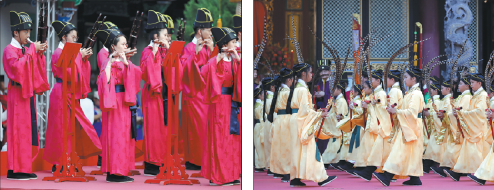Playing music for Confucius' birth, children open door to tradition

Teenagers in red T-shirts holding various traditional musical instruments quietly and solemnly exited along a designated path in the courtyard of the Taipei Confucius Temple. With the final command, "Ritual completed," they finished a comprehensive rehearsal for the annual ceremony marking Confucius' birth.
The atmosphere immediately livened up as the teenagers dispersed into the shaded corridors. They chatted among themselves or pulled out their phones to play games.
Since the school semester started in September, these junior high school students have been rehearsing every Saturday morning at the temple. For nearly a year, they not only practiced their musical instruments regularly, but also completed a week of training during the winter break and five weeks during the summer vacation.
On Sept 28, they donned long red robes and tall black hats for their first performance at the annual ceremony marking Confucius' birth, which strictly followed the rituals practiced for centuries across China.
The ceremony included a principal presentation officer, a consecration officer, and collateral presentation officers. Last year, Taipei Mayor Chiang Wan-an served as the principal presentation officer and Kung Tsui-chang, a 79th-generation direct descendant of Confucius, served as the consecration officer.
The attendants at the service, called "deacons", were made up of respected local elders and students from the nearby Taipei Minglun High School. The musicians who performed the ceremonial music were mostly students from the Taipei Chongqing Junior High School, while the dancers who performed the ceremonial dance were selected from students at the Taipei Dalong Elementary School.
"My elder sister was a vocal member of the musicians. Inspired by her, I wanted to give it a try too," said Hsieh Ya-han, now in her second year of junior high school.
Before joining the performance, Hsieh had no previous experience with traditional musical instruments. Over the past year, she practiced the xiao, a vertical bamboo flute, every Wednesday after school. She worked diligently to achieve the tall task of learning 10 pieces of music to meet the standards of the ceremony.
The music performed at the ceremony is based on that played at the memorial service for Confucius during the Ming Dynasty (1368-1644), with the lyrics dating back to the Song Dynasty (960-1279).
A total of 21 traditional Chinese musical instruments were used in the performance. Hsieh's classmate, Shih Chin-yao, played the bo fu, a rare percussion instrument shaped like a small double-sided drum, which is hardly ever seen in today's traditional Chinese orchestras.
"I have learned violin and other musical instruments from a young age. When I found out I could learn how to play traditional instruments in the training program at the Confucius Temple, I signed up right away," Shih said.
Shih came across some challenges when learning to play the bo fu. "The rhythm is steady with little variation, so I need to keep both my body and hands stable," he said. At home, he often practices without the instrument, even making a cardboard version to simulate it.
The training during the summer vacation was especially tough. From July to early August, the performers rehearsed from Monday to Friday in the morning, practicing not only their instruments but also standing in a military-like formation under the hot summer sun for 90 minutes a day. This physical training was essential to prepare them for the demands of the full ceremony performance.
Most musicians were selected from the first-year students. After performing at the ceremony in the beginning of their second year, most end their involvement in this unique extracurricular experience.
"Every autumn, I bid farewell to one group of students and welcome a new group. Over the years, I've trained at least 3,000 children," said Sun Rui-jin, who has been the chief musician at the Taipei Confucius Temple for 37 years.
Reflecting on the changes over time, Sun noted the shifts in how Confucius is viewed. "In the past, Confucius held a very significant place in people's life in Taiwan, and students deeply respected him as a wise sage. But today's children may not see him the same way," Sun said.
Hsieh and her classmates received a different education compared to their parents. Due to the current authorities' independence agenda, their geography and history lessons now focus on Taiwan rather than the whole of China. Additionally, the proportion of classical Chinese texts in Chinese language classes has significantly diminished.
Despite these changes, the students still have their own understanding of Confucius. "He was a wise man," Hsieh said.
Shih said, "We read about him in our textbooks, and what we're learning as musicians at the ceremony is a form of cultural inheritance."
"As teachers, we need to adjust our methods," said Sun. "I try to present Confucius as someone more approachable and interesting, not just a stern old man, so that students can relate to him better."
For the teenagers, being musicians at the Confucius Temple has opened a door to connect with tradition. "One of the students who played drums had dyed blonde hair and looked very fashionable. Surprisingly, when she went to college, she majored in the guqin (a plucked Chinese musical instrument)," Sun said.
As he grows older, Sun has found a successor. His assistant, who has participated in the ceremony for 10 years, is poised to take over. "I hope that the ceremony's elegant music and Confucian traditions will continue in Taiwan."
Next year's ceremony will likely be performed by a new group of students, but previous musicians can also apply to participate. "I will definitely apply next year," Hsieh said.


Today's Top News
- Systematic approach sees return of clear waters to the Yangtze River
- IP protection for new fields to improve
- Draft rules define premade dishes in consumer interest
- Xi greets To Lam on election as Vietnam party leader
- China, Brazil vow to further deepen ties
- Xi congratulates To Lam on election as general secretary of Vietnam's CPV Central Committee






























